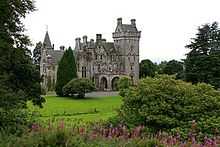John White, 1st Baron Overtoun

John Campbell White, 1st Baron Overtoun JP, DL (21 November 1843 – 15 February 1908), was a Scottish chemical manufacturer, supporter of religious causes, philanthropist and Liberal politician.
Background and education
White was born at Hayfield, near Rutherglen, Lanarkshire, the only son of James White, of Overtoun, by Fanny Campbell, daughter of Alexander Campbell, of Barnhill, Dunbartonshire, Sheriff of Renfrewshire. He had six sisters. His father was originally a lawyer, who had left the legal profession to join John & James White, chemical manufacturers, a firm founded by his father and uncle at Rutherglen in 1810. James Smith was chief administrator of the fund set up for the sufferers of the City of Glasgow Bank collapse in 1878. After his death citizens of Glasgow erected a statue of him at Cathedral Square, Glasgow. John White was educated at Stow's Academy, Glasgow, and at the University of Glasgow. He won prizes in both logic and natural philosophy. He came into close contact with William Thomson, the future Lord Kelvin, and worked in his laboratory for a year.[1]
Business life
White graduated in 1864, and worked for a year for his uncle's company, Mackenzie & Aitken, accountants, and then for a year and a half for Leisler, Bock & Co, continental merchants. He then joined his father's business, of which he became a partner in 1867. After his father's death in 1887 White and his cousin William Chrystal became the sole partners in the Shawfield Chemical Works, which was the largest of its kind in the world and employed some 500 men in 1909. The main product was bichromate of potash. His nephew H. H. Barrett was later admitted a partner. At Rutherglen he constructed an institute for his workers, with baths, gymnasium and reading rooms, et cetera.[1]
According to the Oxford Dictionary of National Biography: "He would be remembered solely for his peerless philanthropy and Christian zeal were it not for the fact that the source of his wealth was a chemical works where the wages and working conditions were scandalous. In 1899 Keir Hardie exposed conditions at Overtoun's works in the Labour Leader; the allegations were also circulated in pamphlets. There was no effective rebuttal of the charges and Overtoun stood accused of hypocrisy, not least because his passionate sabbatarianism did not extend to closing his chemical works on Sundays. While Overtoun was somewhat distanced from the daily running of the Rutherglen works, it was impossible for him to escape some of the odium for conditions in a third-generation family firm of which he was sole proprietor."
Religious affairs
White was also strongly involved in religious matters. He was a supporter of the Free Church of Scotland and donated a mission hall in Dunbarton. He was greatly involved in the union with the United Presbyterian Church of Scotland in 1900 which led to the formation of the United Free Church of Scotland. In 1874 he became strongly influenced by the evangelical preachings of D. L. Moody. After Moody's departure from Great Britain the Glasgow United Evangelistic Association was set up, of which White became president. He was one of the leading powers behind the construction of the Association's building in Bothwell Street, Glasgow, at a cost of over £100,000. The building housed the Bible Training Institute, the Young Men's Christian Association and Young Men's Christian Club. He also led bible classes at Dunbarton and preached throughout Great Britain.[1]
Politics
White was a Liberal in politics and served as Chairman of the Dunbartonshire Liberal Association and as a Vice-President of the Scottish Liberal Association. When the Liberal Party split over Irish Home Rule in 1886, he followed William Ewart Gladstone. He declined to stand as the Liberal candidate for Dunbartonshire in 1889 but took an active part in supporting John Sinclair candidature in the 1892 general election, where 50 years of Conservative domination in the constituency was broken. In 1893, on the recommendation of Gladstone,[1] he was raised to the peerage as Baron Overtoun, of Overtoun in the County of Dumbarton.[2] In 1906 his nephew James Dundas White was returned for Dunbartonshire. In 1907 Lord Overtoun was appointed Lord-Lieutenant of Dunbartonshire, a post he held until his death the following year.[1] He was also a Deputy Lieutenant for Dunbartonshire and a Justice of the Peace for Dunbartonshire and Lanarkshire.[3]
Personal life
Lord Overtoun married Grace Eliza McClure, daughter of James H. McClure, a Glasgow solicitor, in 1867. They had no children. He died at Overtoun House after a short illness in February 1908, aged 69. The barony died with him.[1]
References
External links
- Hansard 1803–2005: contributions in Parliament by Lord Overtoun
| Honorary titles | ||
|---|---|---|
| Preceded by Sir James Colquhoun, Bt |
Lord-Lieutenant of Dunbartonshire 1907–1908 |
Succeeded by The Lord Inverclyde |
| Peerage of the United Kingdom | ||
| New creation | Baron Overtoun 1893–1908 |
Extinct |